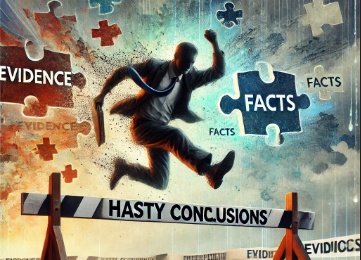n the fast-paced world we live in, it’s common for individuals to make quick decisions. However, the psychological phenomenon known as hasty conclusions can significantly influence our understanding and decision-making processes, often leading to flawed outcomes. This detailed exploration delves into what hasty conclusions are, their implications in everyday life, and their interconnectedness with other cognitive biases such as confirmation bias, stereotyping, and the availability heuristic.
Understanding Hasty Conclusions
Hasty conclusions refer to the tendency to form judgments or make decisions without sufficient evidence or information. This cognitive shortcut can lead to misinterpretations and errors in judgment. In psychological terms, reaching hasty conclusions is often a result of our brain’s desire to quickly interpret and react to information, bypassing thorough analysis.
Implications of Hasty Conclusions
The implications of hasty conclusions are vast and varied, affecting personal relationships, professional environments, and even societal dynamics. For instance, in a professional setting, a manager might hastily judge an employee’s capability based on a single performance rather than a comprehensive evaluation, potentially leading to unfair treatment or decisions.
Related Cognitive Biases
Understanding related cognitive biases provides deeper insight into how hasty conclusions are formed and the broader context of human judgment errors.
Confirmation Bias
Confirmation bias is the tendency to search for, interpret, favor, and recall information in a way that confirms one’s preexisting beliefs or hypotheses. It is a significant factor in why individuals might reach hasty conclusions, as they may only acknowledge information that aligns with their existing views, disregarding any conflicting evidence. For example, an investor may overvalue information that suggests a positive return on a risky investment while ignoring warnings about the potential downsides.
Stereotyping
Stereotyping involves creating an oversimplified image of a particular group of people, usually by assuming that all members of the group share certain qualities or behaviors. Stereotyping is a form of hasty conclusion because it involves making broad generalizations without sufficient evidence. This can lead to prejudice and discrimination, as it does not consider individual differences.
Availability Heuristic
The availability heuristic is a mental shortcut that relies on immediate examples that come to a person’s mind when evaluating a specific topic, concept, method, or decision. The frequency and emotional charge of these examples can lead to a skewed perception of reality. For instance, people might overestimate the likelihood of airplane accidents after hearing recent reports about such incidents, despite statistical evidence showing that air travel is one of the safest modes of transportation.
Combating Hasty Conclusions
To avoid the pitfalls of hasty conclusions and related biases, it is essential to develop critical thinking and analytical skills. Here are some strategies:
- Seek Diverse Perspectives: Actively seek out information and viewpoints that challenge your preconceptions.
- Think Critically: Analyze information critically, evaluating the source, context, and potential biases before forming a conclusion.
- Pause and Reflect: Allow yourself time to reflect on information, especially when making important decisions.
- Engage in Dialogue: Discuss your ideas and perceptions with others, especially with those who might have different viewpoints.
- Educate Yourself Continuously: Stay informed about cognitive biases and learn how they can distort thinking.
The Role of Education in Addressing Cognitive Biases
Education plays a pivotal role in mitigating the effects of cognitive biases, including hasty conclusions. Educational systems that emphasize critical thinking, logical reasoning, and ethical judgment can help individuals recognize and counteract these biases. Furthermore, integrating psychology and cognitive sciences into the curriculum can equip students with the tools to understand and manage their cognitive processes more effectively.
Conclusion
Hasty conclusions can significantly impact our judgments and decisions, leading to errors and misunderstandings. By understanding related cognitive biases like confirmation bias, stereotyping, and the availability heuristic, individuals can develop strategies to mitigate these effects. Education and continuous learning remain key in fostering a society capable of making well-informed decisions.
In a world increasingly dominated by quick access to information, it is more crucial than ever to slow down our cognitive processes to ensure our conclusions are well-founded. Understanding the psychological underpinnings of hasty conclusions not only enhances personal decision-making but also promotes a more empathetic and understanding society.







